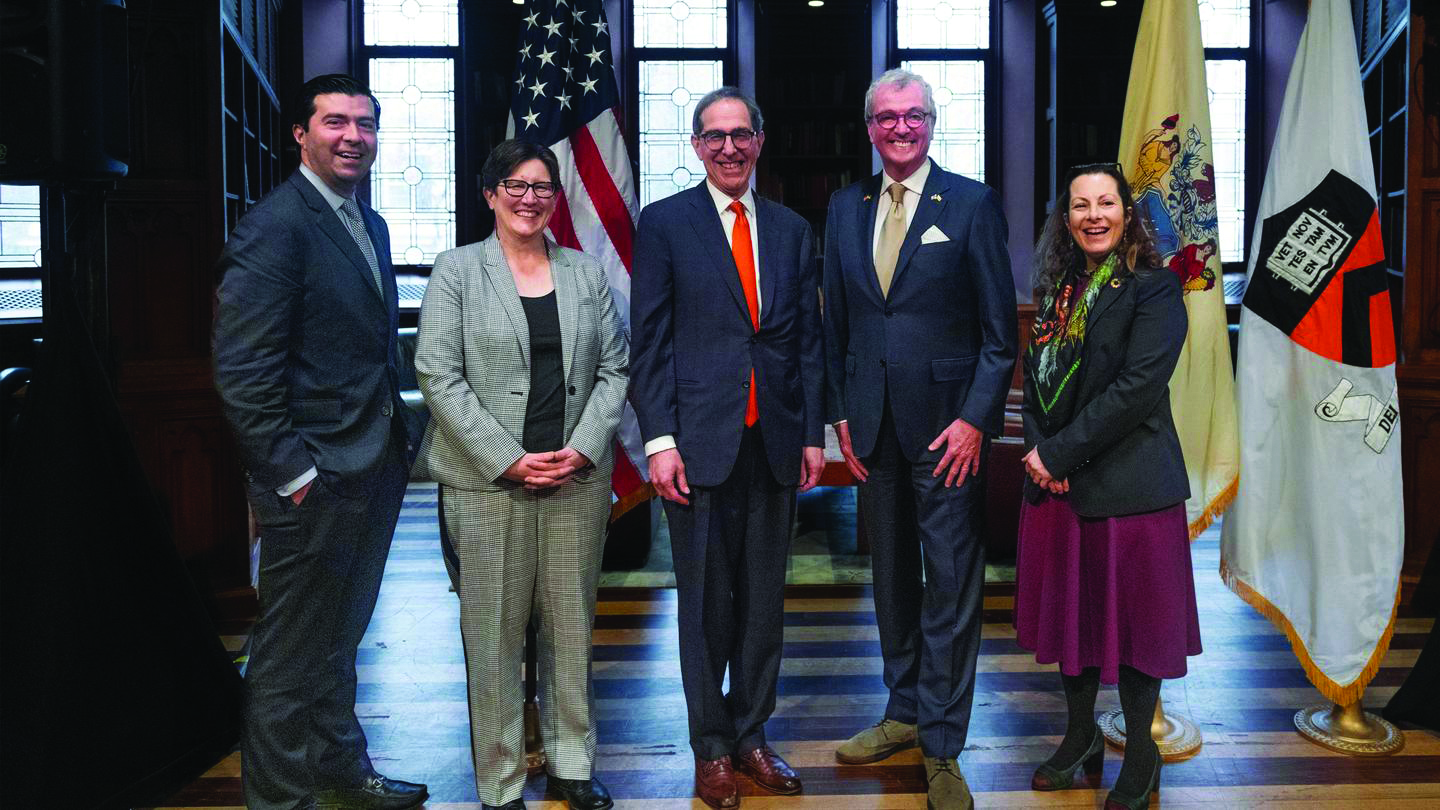With AI exploration in full swing across the higher education community, Princeton University is among the institutions investing in AI research and supporting interdisciplinary collaborations among researchers who are using AI technology. As a key partner in creating an artificial intelligence innovation hub for New Jersey, Princeton aims to help advance the ethical use of AI and promote workforce development in collaboration with universities, community colleges, and vocational schools across the state. “Princeton has the AI lab which currently includes four initiatives focused on AI, which include the Princeton Language and Intelligence (PLI) Initiative, Princeton Precision Health (PPH), AI for Accelerating Invention (AI2), and Natural and Artificial Minds (NAM),” explains Curt Hillegas, Ph.D., Senior Associate Dean, Research Computing & the Princeton Institute for Computational Science and Engineering (PICSciE), Princeton University. “Along with AI, we see quantum science as the wave of the future and wish to be impactful in this space as we create initiatives that help push the boundaries of multiple fields at once.”
New Jersey AI Hub
In December 2023, Princeton University President Christopher L. Eisgruber and New Jersey Governor Phil Murphy announced a plan to create an AI innovation hub in collaboration with the New Jersey Economic Development Authority. The New Jersey AI Hub aims to create a collaborative space for AI researchers, startup companies, industry leaders, and other innovators to advance research and development and pioneer technologies that can benefit individuals worldwide. “Bringing together academia, industry, and government, this integrated hub of AI activity will foster collaboration on AI development and innovations,” said Princeton University Provost, Jen Rexford. “The input and feedback we receive through this RFI will build upon Princeton’s leadership in AI and the strengths of the Central New Jersey region to ensure that we are leveraging the expertise and insights of various stakeholders, including New Jersey’s outstanding higher education institutions.”
In his role as Senior Associate Dean for Research Computing, Hillegas says a top priority is determining how AI can enable research and which technical and human resources can best support researchers in their endeavors. “We have always had a strong computational infrastructure, and as AI becomes more important, we are focusing on tuning accelerators like GPUs to conduct AI work, as well as incorporating new advanced tools and instruments. Since data quickly becomes less useful as it ages without proper data management processes, we are shifting the culture at Princeton from being a data storage facility to a data management facility.”
The Princeton research community uses the data management service, TigerData, to access software tools and tiered storage that enable the sharing and sustainability of research and administrative data. “TigerData will help our researchers to follow the FAIR guiding principles for data: Findable, Accessible, Interoperable, and Reusable,” shares Hillegas. “We also have a service called Citadel, which is our secure research infrastructure and allows researchers to securely analyze, store, and share data while preventing unauthorized access and distribution. By partnering with our faculty, we learn how they use data, what instruments they use, and we can better support their efforts. We interface with the workflows of the researchers and help to develop new ones that fit into what they have in place so they can be more productive and successful.”
“This industry is very homogeneous, and it is a big challenge to get a diverse candidate pool. We are trying to broaden and attract more people to join this field and promote greater equity and diversity. Centers like the AI Hub can bring together people with different experiences and expertise and help accelerate innovation across a variety of disciplines.”
— Curt Hillegas, PH.D.
Senior Associate Dean, Research Computing & the Princeton Institute for Computational Science and Engineering (PICSciE), Princeton University

Supporting Research Computing
Over the years, Princeton has invested strongly in research computing and continues to expand computing capabilities to keep pace with changing needs. “High performance computing is spreading almost ubiquitously into all areas of the University,” shares Hillegas. “These resources used to be focused primarily on science and engineering, but we see it expanding not only across more disciplines and divisions of the University, but also much deeper into the fields where it already existed. This evolution has also involved human resources, where our research computing group in 2011 was eight people, and now, our group has over fifty individuals.”
“The framework for supporting the research computing deployed by Princeton University is a model to be replicated,” says Forough Ghahramani, Assistant Vice President for Research, Innovation, and Sponsored Programs, Edge. “As an R&E network, we are in a unique position to support the efforts at Princeton and are excited to have a role in helping to position New Jersey for leadership in AI.”
As the University continues to transform and raise Princeton’s competitiveness for research, Hillegas says diversifying the industry is among the most important challenges. “This industry is very homogeneous, and it is a big challenge to get a diverse candidate pool. We are trying to broaden and attract more people to join this field and promote greater equity and diversity. Centers like the AI Hub can bring together people with different experiences and expertise and help accelerate innovation across a variety of disciplines.”
To unite faculty and researchers from diverse backgrounds, the Princeton Institute for Computational Science and Engineering (PICSciE) is an interdisciplinary institute that provides the intellectual infrastructure needed to facilitate scientific and technical progress in research computing. Since 2002, PICSciE has grown to include members from social sciences, humanities, and engineering and science departments, as well as the Geophysical Fluid Dynamics Laboratory (GFDL) and the Princeton Plasma Physics Laboratory (PPPL).

The artificial intelligence hub, announced in December 2023 by New Jersey Governor Phil Murphy and Princeton University President Christopher L. Eisgruber, will bring together AI researchers, industry leaders, start-up companies, and other collaborators to advance research and development.
Photo credit: Princeton University, Denise Applewhite
Strengthening Workforce Development
In recent years, Princeton has had to scale up staffing in response to the dedicated research requirements of a wide variety of research domains. Many of the University’s recent hires are well versed in machine learning, computer vision, natural language processing, and AI best practices. “Princeton has set up a governance that includes the faculty,” says Hillegas. “For example, our Research Computing Advisory Group (RCAG) assists in research computing governance and advises and collaborates with the Dean for Research and PICSciE on matters related to research computing in all academic disciplines. We look to our faculty to share their needs and we have leaders who are extremely supportive of this direction for our research.”
“As we develop as a community,” Hillegas continues, “Collaborations like the AI Hub bring together faculty, researchers, and thought leaders who can help drive the direction of research and workforce development. For example, in the area of Research Software Engineering we have created a seven-level job class structure that we have shared with the community and those structures are being built out to include a broader scope of cyber professionals. In addition, system administrators for administrative computing and research computing do not necessarily have the same drivers or the same needs. The people supporting researchers are often addressing issues that fall between academic and research, and the assistance a standard help desk would provide is different than what researchers need. We have researcher-facing, hardware-facing, data-facing, policy-facing, and software-facing strategies and want to make sure that all of these areas are different in supporting research than they would be in supporting standard IT.”
To give Princeton students and students from other colleges and universities an opportunity to gain hands-on research experience, the University offers a variety of summer programs in different fields. “For undergraduate and graduate students interested in gaining software engineering research experience, Princeton has a summer program where students from around the country come to explore this area and work directly with our faculty,” says Hillegas. “This year, we have three students working with our research software engineers. Two students are working with our visualization team, and one is working alongside our TigerData team and all are learning about this field and contributing to the work going on. Students enter an environment of belonging, because one of my key philosophies for our group is that everybody in the room has something to offer, no matter their background or how long they’ve been in the field. Everyone should have a voice, because their ideas are valid and may be what leads to a solution.”
“The framework for supporting the research computing deployed by Princeton University is a model to be replicated. As an R&E network, we are in a unique position to support the efforts at Princeton and are excited to have a role in helping to position New Jersey for leadership in AI.”
— Forough Ghahramini, Ed.D.
Assistant Vice President for Research, Innovation, and Sponsored Programs, Edge

Collaboration is Key
As Princeton continues to enhance the University’s research computing portfolio, building internal and external partnerships has been paramount. “There’s a saying that the solution is always in the room,” says Hillegas. “Building connections on campus, as well as throughout the higher education and business community, is essential to expanding research that will benefit society. We are a member of the Coalition for Academic Scientific Computation (CASC), we actively participate in Educause, and are part of the Ivy Plus research computing group.”
“All of these groups provide an opportunity to have conversations around a common focus,” continues Hillegas. “Educause enables schools that are just starting out in research computing or have less mature programs to partner with institutions that have well established programs. We can all learn from each other, share best practices, discuss challenges and solutions, promote diversity and inclusion, and find ways to build a supportive learning community for all. So many exciting developments are unfolding in the research space, especially in quantum computing and AI. I’m looking forward to seeing what discoveries are ahead and for Princeton to continue to expand its role in helping advance interdisciplinary innovation.”


